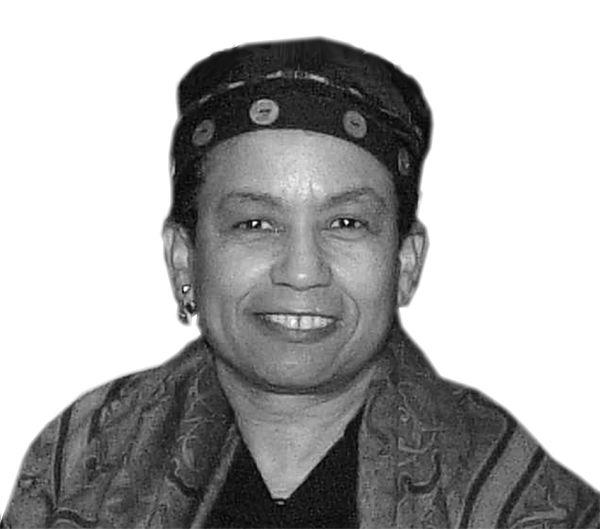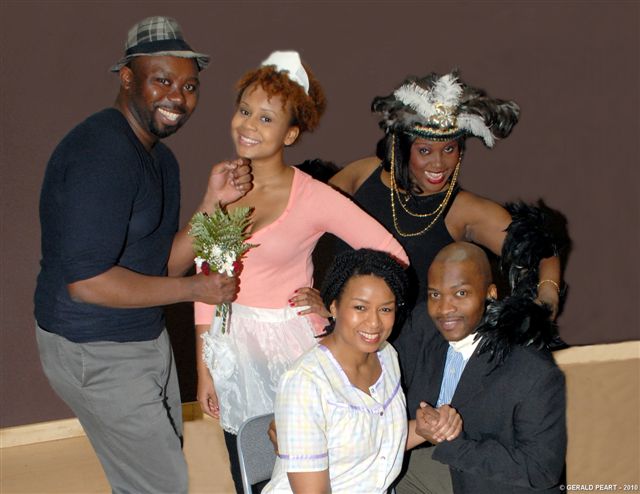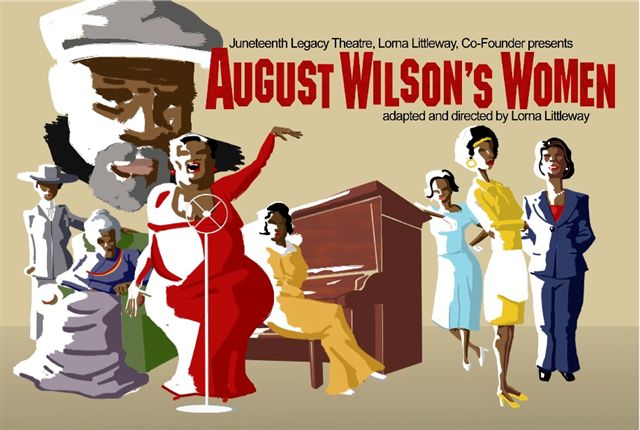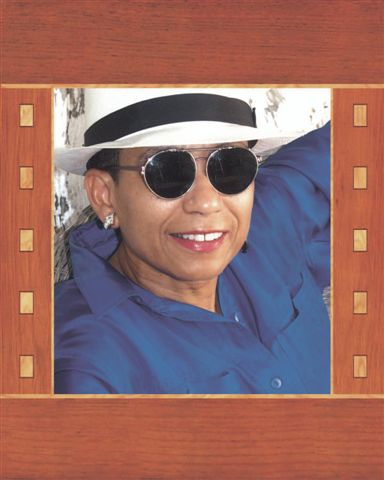AN INTERVIEW WITH LORNA LITTLEWAY
DIRECTOR OF AUGUST WILSON'S WOMEN
Special for THE NEW TIMES HOLLER!
FOCUS: AUGUST PRESENTATIONS OF THEATRICAL LEGACIES
© Amir Bey, 2010
March 12
info@thenewtimesholler.com
|
THE NEW TIMES HOLLER! would like to follow up on the activities of Juneteenth Lecacy theater, with an interview of the theater company's co-founder,
Lorna Littleway. (See our earlier interview with Lorna) Over the years Juneteenth
has been based in Louisville, Kentucky, and is about to move on. Besides Louisville, Juneteenth has also produced plays and conducted workshops in other cities and is currently involved in an interesting production, August Wilson's WOMEN.
A compilation, it's a unique focus on this master's work that has come about through revelations on the female characters in Wilson's plays.
For more information on Juneteenth, check out Juneteenth Legacy's website.
| LORNA LITTLEWAY

Co-Founder of Juneteenth Legacy Theater, director of August Wilson's WOMEN
|
HOLLER!: Is Juneteenth Legacy Theater still active in Louisville?
LITTLEWAY: This summer’s festival of new plays, 11th Annual Juneteenth Jamboree, is the last program JLT produces in Louisville. The festival runs June 3rd to the 19th. I’m calling it the “Festival of Who in Black America”. It will feature a cabaret of songs by legendary blues singers Bessie Smith, Ethel Waters, Billie Holiday, Dinah Washington and Lena Horne (Juneteenth Blues Cabaret); a drama about Civil Rights folk heroes Mamie Till and her teenage son, Emmett (Till); another drama about Harlem Renaissance icon, Bruce Nugent, and AIDS activist, Essex Hemphill, (Passing Ceremonies); and an EveryWoman-EveryMan comedy about an elderly couple’s efforts to convince the Social Security Administration that they are still alive (How Long Have I Been Dead Anyway?)
HOLLER!: Tell us about your latest project, August Wilson’s WOMEN.
LITTLEWAY: The production is a compilation of excerpted scenes, highlighting the women characters, from all ten Wilson plays. The idea for this specific project is in response to the criticism that Wilson is biased against women or indifferent towards them; that he does not really tell a woman’s story. I think it’s more accurate to say that directors and critics, who more often than not are men, don’t pay much attention to the women.
Rose is as compelling as Troy Maxson in Fences. When Fences first played Broadway, all the promotional talk was about the father-son relationship and his opposition to the boy playing sports because of the discrimination the father experienced in baseball. I saw and read the play and thought, “My goodness, this play is about a husband-wife relationship, and the son is a facet of it. Cory-Troy is not the center of that play, Rose-Troy is!” Similarly in The Piano Lesson, Berniece is an equal adversary to Boy Willie.
|
THE COMPANY

Standing (left to right) Jamil A.C. Mangan, Kimberley Dalton Mitchell, Jannie Jones; Seated (left to right) Thursday Farrar and Michael Jones.
The scenes are from Two Trains Running (Jamil & Kimberley), Ma Rainey's Black Bottom (Jannie) and The Piano Lesson (Thursday & Michael).
|
HOLLER!: How are you approaching Wilson’s material differently than has been done before?
LITTLEWAY: The men in Wilson’s plays are “showier” characters, who experience a type of redemption; Troy, Boy Willie, Harmond Wilks (Radio Golf), etc. That redemption is through the efforts of the women in their lives. So the approach is to focus on these “Redeemers”.
The cast is three women –Jannie Jones, Thursday Farrar and Kimberley Dalton Mitchell- who portray 14 characters: In addition to Rose and Berniece, there are: Aunt Ester and Black Mary (Gem of the Ocean), Mattie Campbell and Mollie Cunningham (Joe Turner’s Come and Gone), Ma Rainey and Dussie Mae (Ma Rainey’s Black Bottom), Vera Dotson, Louise and Ruby (7 Guitars), Risa (Two Trains Running), Rena (Jitney), Tonya (King Hedley) and Mame (Radio Golf). [There are also two actors, Jamil A.C. Mangan and Michael Jones, who portray the male foils.)
Through the rehearsal process, we are all amazed at how decisive, intuitive, and strong the women are, and the evolution of their assertiveness over the decades.
|
August Wilson's WOMEN

Image by Kyle Ware
|
HOLLER!: In terms of Juneteenth Legacy’s previous productions, what is the importance of this play?
LITTLEWAY: It’s very important that black theater companies are able to produce August Wilson’s plays and present his works in their communities. It is a tremendous undertaking in required resources. Casts tend to be mid-size, 7-10 actors, and you need skilled actors, who can handle the language and lengthy monologues characteristic of his plays. Also, the actors must be able to view their characters through the lens of black history because that is the backdrop of Wilson’s plays. Likewise your production team of designers must be top notch, too. And ideally, a longer rehearsal period of at least one week would be scheduled.
These are significant challenges for small-budget companies. I’m very fortunate to be producing August Wilson’s Women in New York City because here I can get very talented and experienced actors and designers, committed to the man and his work, who are doing this for less compensation than usual. Nevertheless, JLT is investing nearly double what it usually spends on productions. I’d hate to see August Wilson’s plays become the province of mid-size and large-budget companies only.
|
LITTLEWAY

|
HOLLER!: Although people are familiar with your work in theater, you’ve also worked as an extra in films. In the many films that you were an extra, were any of them action-type films?
LITTLEWAY: No, I stopped working in film once I turned to producing 11 years ago, and action movies were not such a big thing to film in New York City. I think the most “action” was a Bruce Willis-Morgan Freeman movie that was filming in Washington heights and by today’s standards that was pretty tame.
HOLLER!: I’m going to ask a devil’s advocate-type question: there are many roles that actors take in film that are ideal in terms of theme and pay, while some are not ideal in either. I recently saw Brooklyn’s Finest, a film that uses a lot of 1970s disaffected cop clichés. It stars Don Cheadle, Wesley Snipes, Ethan Hawke, Richard Gere, Michael Kenneth Williams and others. The film’s pluses are that it has a lot of star power, and added with the intensity of the action, it was gripping at times. These major stars are capable of acting in wide ranges of themes, yet it seems that sometimes they still have to go for the gore and guts, shooting up ghetto gangstuhs, saving white sex slaves, etc. Is an actor sacrificing quality and maybe, some principals, are is this part of what taking on roles and being an actor is about?
LITTLEWAY: An actor has to be willing and able to get into any character’s head whether or not the character jibes with her or his personal belief, principles, or preferences. An actor simply isn’t going to work very much, if she or he personally must be aligned with the character. If you want that kind of control, then produce.
HOLLER!: Any projects or desired goals after August Wilson's Women?
LITTLEWAY: August Wilson is America's Shakespeare and I am committed to keeping his work before the public. The enormity of August's contribution chronicling the black experience is even more striking when viewing excerpts from all his plays in one evening. I've had audience members say that it makes them want to read his plays! I have other thematic adaptations of his work, two that have been presented in Louisville, one as a staged reading and the other as a performance for middle school children that I'd like to produce in New York City as well as create other adaptations. The possibilities are endless!
|
|
|
|
|